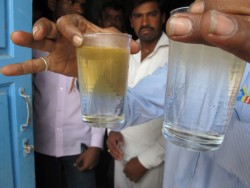Agricultural activities account for 70% of global water usage. Food production and the associated supply chain account for about 30% of total global energy consumed. While there is an awareness of the water, energy, and food (WEF) nexus, there is a lack of effective and integrated initiatives to address it. As described by the United Nations: “The global community is well aware of food, energy, and water challenges, but has so far addressed them in isolation, within sectoral boundaries. At the country level, fragmented sectoral responsibilities,
lack of coordination, and inconsistencies between laws and regulatory frameworks may
lead to misaligned incentives.” Despite the emphasis on taking a nexus approach for sustainable development, there is limited knowledge of what this means in a rural context.
From 24 to 25 August 2016, the Smart Villages Initiative along with Energy4Impact organised
a regional workshop in West Africa in Saly, Senegal to develop a better understanding of the
water-energy-food (WEF) nexus in the region. The workshop brought together stakeholders
from 15 countries from across the region and garnered substantial interest among a wide-range of stakeholders including representatives from the public sector, the donor community, non-governmental organisations (NGOs), the private sector, and academia.
Participants at the workshop were informed that an integrated approach needs to be taken to have a positive effect on those living in rural areas. An inter-sectoral approach is required to deal with the WEF nexus. An integrated approach that balances the utilisation of these resources is important for sustainable development in West Africa.
The Economic Community of West African States (ECOWAS) comprises 15 countries. The majority of the people living in these countries, especially in rural areas, do not have access to electricity and are heavily dependent on using biomass to meet their cooking needs. Agriculture remains the main source of income for most of the population. However, lack of access to energy for irrigation means that it is largely rain-fed and is negatively affected by climate change.
Workshop participants considered that the immense development challenges facing the region
require a shift in the development paradigm from a siloed approach to policymaking towards one that is cognisant of the inter-sectoral linkages between various resource systems. There has to be capacity at national and sub-national levels to understand competing interests, synergies and needs between water, energy, and food systems. Local institutions and communities can play an important role in managing potential trade-offs and improving synergies between the various sectors.
The agriculture system in the region is dominated by smallholder farms, and, for sustainable
development, it is necessary to work with these farmers and the broader community to improve resilience to exogenous shocks such as climate change. Smallholders who depend on rain-fed agriculture are likely to be most affected by climate change. A participatory approach to development projects based on nexus thinking can ensure buy-in within the community, improve sustainability, and help deal with potential trade-offs between the resource systems. If the various components of the nexus are not dealt with holistically, there are likely to be major challenges for the most vulnerable sections of the population such as women-led households.









